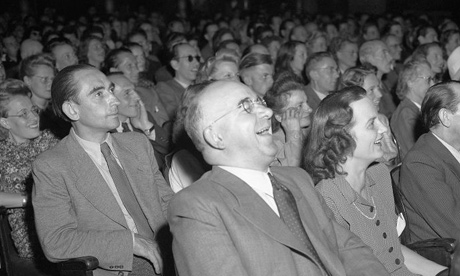By Peter King
You have to laugh. That seems to be the imperative that prompts theatre audiences to cackle at moments of high tragedy and pathos. There is nothing worse than watching a play in the company of spectators who feel they have to prove that they understand the lines better than their fellow theatregoers by hamming up their version of a stage whisper, audience laughter, the main intention of which is to be overheard.
Nobody in their right minds would call the first three acts of The Winter’s Tale – or The Duchess of Malfi, Othello or King Lear – a bundle of laughs, but there seems to be a limitless supply of playgoers who appear determined, whatever horrors they are confronted with, to take it ‘all for jest’, as Leontes says to Camillo.
Perhaps when they are not being confronted with tragic events on the stage they go to amuse themselves at the site of road accidents – and no doubt in another time they would have toddled off to Tyburn for a spot of light entertainment.
Antony Sher’s chilling interpretation of the fearful consequences of an unhinged mind in the head of the tyrant king in the Royal Shakespeare Company’s production of The Winter’s Tale at the Barbican Theatre, is enough to stir terror in the hearts of normal people living at a safe remove from the savagery of a Jacobean police state. But members of the audience in the Heritage Theatre video production were able to see the funny side of the fevered king’s obsession with his pond being ‘fish’d by his next neighbour’ – and the idea that the horrified Antigonus might be prepared to geld all his daughters if this proved true, was simply a hoot.
When Paulina, banned from seeing the falsely accused queen on death row, said ‘Here’s ado’, this proved a cue for more artificial laughter – and when Leontes, reaching the height of his madness, said that he knew that the forceful Paulina would come, despite his express command, the eyes of the know-alls in the audience just started to water.
One of the biggest guffaws came when the king, who had just called for his wife and baby daughter to be burnt alive, attacked Antigonus for not being able to control his wife’s tongue. Antigonus replied that if you hanged all the men who shared that weakness, there would hardly be a single man left standing. And the unreconstructed 21st century spectators, hardened to burning at the stake and the murder of newly-born girls, could really see the funny side of that.
And while older theatregoers look for any opportunity to air their privileged knowledge of the text, younger ones – the kind who believes it is their mission to wreck matinee performances – milk the mightiest tragedies for cheap laughs.
At David Farr’s recent Royal Shakespeare Company production of King Lear at The Roundhouse, a gaggle of girls got the giggles when Kent manhandled the diminished king on to his shoulders for a piggyback ride – and the sight of Lear’s trousers seeming to slip down or Edgar as Poor Tom in a loin cloth, naturally triggered chuckles of titillation from the girls.
An unintended fatal moment came at the start of the second half of Laurie Sansom’s production of The Duchess of Malfi at the Royal & Derngate Theatre, Northampton, when the theatre was plunged into darkness and the actors lost their audience – and when light was restored the sight of a bouncing severed hand was simply side-splitting.
A bad death scene, such as Desdemona kicking her feet while she is being smothered during the Lenny Henry production of Othello at Trafalgar Studios in London’s West End, can also reduce onlookers to helpless heaving.
Playgoers, whether from a desire to show off or to undermine the suspension of disbelief, seem to look for any excuse for mirth when they enter a theatre and they take the view that stage business is created, in the words of the exchange between Leontes and Antigonus, to ‘raise us all./To laughter’.
The great dramatists are masters of the pathetic, the shocking and the tragic, but it is hard properly to appreciate their servings of high emotion when the spectators around you are ostentatiously trying to squeeze the last drop of humour out of the journey from horror to catharsis.
Send your comments on Peter’s piece to www.inkpellet.co.uk/join-in.



